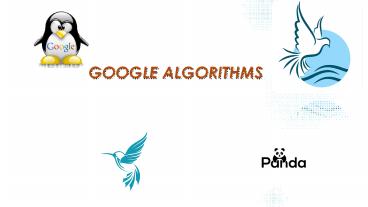Google Algorithms - PowerPoint PPT Presentation
Title: Google Algorithms
1
GOOGLE ALGORITHMS
2
What is Google Algorithm?
- Google search algorithm is a complex system that
allows Google to find, rank, and return the most
relevant pages for a certain search query. - To be precise, the whole ranking system consists
of multiple algorithms that consider various
factors such as quality, relevance or usability
of the page.
3
Types of Google Algorithms
- Google Panda
- Google Hummingbird
- Google Pigeon
- Google Penguin
- Core Updates
- Mobile
- Rank Brain
4
Google Panda
- Google Panda initial release date February
23,2011 - Google Panda is a major change to Googles search
results ranking algorithm that was first released
in February 2011. The change aimed to lower the
rank of "low-quality sites" or "thin sites", in
particular, content farms", and return
higher-quality sites near the top of the search
results. - The panda address several problematic phenomena
like-- Thin content, Duplicate content,
Low-Quality content, Lack of authority, Content
farming, Low-Quality content surrounding
affiliate link, Websites blocked by users,
Content mismatching search query. - One signal of a potential Panda penalization is a
sudden drop in your websites organic traffic or
search engine rankings correlating with a known
date of an algorithm update.
5
GOOGLE HUMMINBIRD
- Google Hummingbird initial release date August
20,2013 - Hummingbird is the codename given to a
significant algorithm change in Google Search in
2013. Its name was derived from the speed and
accuracy of the hummingbird. The change was
announced on September 26,2013, having already
been use foe a month. - Hummingbird places greater emphasis on natural
language queries, considering context and meaning
over individual keywords. It also looks deeper at
content on individual pages of a website, with
improved ability to lead users directly to the
most appropriate page rather than just a
websites homepage.
6
Google Pigeon
- Google Pigeon initial release date July 24,2014
- One of Googles stated purposes for the Pigeon
update was to connect their local algorithm more
deeply to their traditional web algorithm to take
full advantage of the hundreds of ranking signals
that go into the web algorithm. - For example, when searching for a query like
pizza san Francisco, a user in the North Beach
area of San Francisco would receive local results
narrowed to that neighborhood instead of
city-wide results .
7
Google Penguin
- Google Penguin initial release date April
24,2012 - The penguin update was announced by Google as a
new effort to reward high-quality websites and
diminish the search engine results page (SERP)
presence of websites that engaged in manipulative
link schemes and keyword stuffing. - The initial rollout of Penguin impacted 3.1 of
English language search engine queries. Between
2012 and 2016, the filter went through 10
documented updates, evolving over time and
influencing the SEO communitys understanding of
the problematic practices Penguin sought to
address. - As of early 2017, Penguin is now part of Googles
core algorithm.
8
Core Updates
- Core Update initial release date December 3,
2020 - As far back as 2017, Google has started to refer
to bigger updates as Google core updates. Since
then, there is even less transparency about what
those updates are and which parts of the search
they are intended to improve. - SEOs would often track post-update ranking shifts
and try to figure out what exactly has changed,
but there is rarely a conclusive observation. It
is likely that Google core updates are just
improvements on previous Google updates or
perhaps bundles of smaller updates tied together.
9
Mobile
- Mobile initial release date April 21, 2015
- This, and subsequent mobile search updates
(2018, 2020) have shifted the focus from a
desktop to a mobile version of your website.
Today, Google ranks all websites based on how
fast and user-friendly their mobile versions are.
10
Rank Brain
- Rank Brain initial release date October 2015
- Rank Brain is a part of Googles Hummingbird
algorithm. It is a machine learning system that
helps Google understand the meaning behind
queries and serve best-matching search results in
response to those queries. - Google calls Rank Brain the third most important
ranking factor.While we dont know the exact
formula behind this major update, the consensus
is that Rank Brain is responsible for customizing
a users Google search results. Basically, Google
goes beyond a persons search query and takes
into account the larger context, like synonyms,
implied words, and personal search history.
11
Digital Pundit is the best digital marketing
training academy to learn certified digital
marketing course in Ahmedabad. Our Google
certified expert trainer teach you from the basic
to advanced digital marketing courses in
Ahmedabad.
Address 709 Shivalik Square, 132ft Ring Road,
Near National Handloom,Near Adani CNG Petrol
PumpVadaj, AhmedabadPin Code 380027Mobile-
9173749033,Email sales_at_digitalpundit.in
12
Thank YOU - by Diksha































